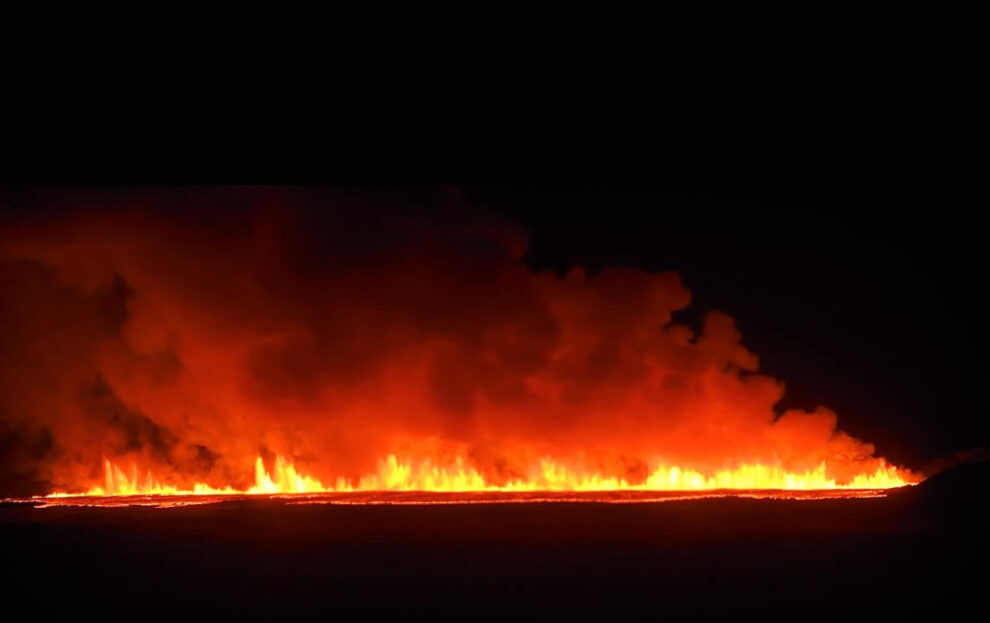Glowing lava spewed Thursday from a new volcanic fissure on Iceland’s Reykjanes peninsula, the third eruption to hit the area since December, with authorities declaring a state of emergency as lava burst a key water pipe.
Video images of the crack in the Earth’s surface, stretching an estimated three kilometres (two miles), showed the fissure illuminating a plume of smoke rising into the dark morning sky that was visible 40 kilometres away in the capital of Reykjavik.
Iceland’s Department of Civil Protection and Emergency Management declared a state of emergency after lava flowed over a pipe transporting hot water to the Reykjanes peninsula, causing the pipe to burst.
“The hot water pipe is broken, which is causing a lack of hot water” in the southern part of the Reykjanes peninsula known as Sudurnes, home to about 28,000 people, the department said in a statement.
“It is now important that residents and businesses in Sudurnes save all electricity and hot water,” it said.
“We are working on figuring out the next steps to make sure people get warm water,” department spokeswoman Hjordis Gudmundsdottir told AFP, saying the water was also used to heat homes around the peninsula.
The department urged residents to refrain from hot showers or baths and conserve water.
– Hours of water left –
Hot water stored in tanks was now the only available source in the area, authorities said.
Under normal circumstances, the tanks can supply the area for three to six hours, but with the conservation measures they could last six to 12 hours.
Seven hours after the eruption began, the IMO said its power was diminishing and lava jets were primarily shooting out of three spots along the fissure.
Large white plumes of steam could be seen billowing from the crack, likely the result of magma entering into contact with groundwater, it said.
The first fountains of lava reached 50 to 80 metres high in some areas and the volcanic plume rose about three kilometres above the fissure, the IMO said.
It had warned Monday that magma accumulation beneath the area meant an eruption was likely in the coming days.
The site is around 40 kilometres southwest of Reykjavik, in the same area as two previous eruptions, the first on December 18 and the second on January 14, near the fishing village of Grindavik.
The roughly 4,000 residents of Grindavik had to be evacuated on November 11 after hundreds of earthquakes damaged buildings and opened up huge cracks in roads, shrouding the village’s future in doubt.
The quakes were followed by a volcanic fissure on December 18 that spared the village, but a second on January 14 opened right on the town’s edge, sending orange lava flowing into the streets and reducing three homes to ashes.
Residents have only been allowed back for short visits since the second eruption.
Thursday’s eruption occurred around four to five kilometres north of Grindavik and two to three kilometres west of the Svartsengi power plant, which supplies electricity and water to around 30,000 people on the Reykjanes peninsula.
The plant was evacuated and has been run remotely since the first eruption in the region, and dykes have been built to protect it.
“The dykes are about 8-10 metres high, made of earth. They encircle the whole plant,” Gudmundsdottir said.
– New era? –
Iceland’s famed Blue Lagoon geothermal spa, a few kilometres north of the eruption, said it had closed Thursday and all guests had been evacuated, with lava later overflowing a road leading to the site.
Iceland is home to 33 active volcano systems, the highest number in Europe.
It straddles the Mid-Atlantic Ridge, a crack in the ocean floor separating the Eurasian and North American tectonic plates.
But until March 2021, the Reykjanes peninsula had not experienced an eruption for eight centuries.
Further eruptions occurred in August 2022 and in July and December 2023, leading volcanologists to say it was probably the start of a new era of seismic activity in the region.
